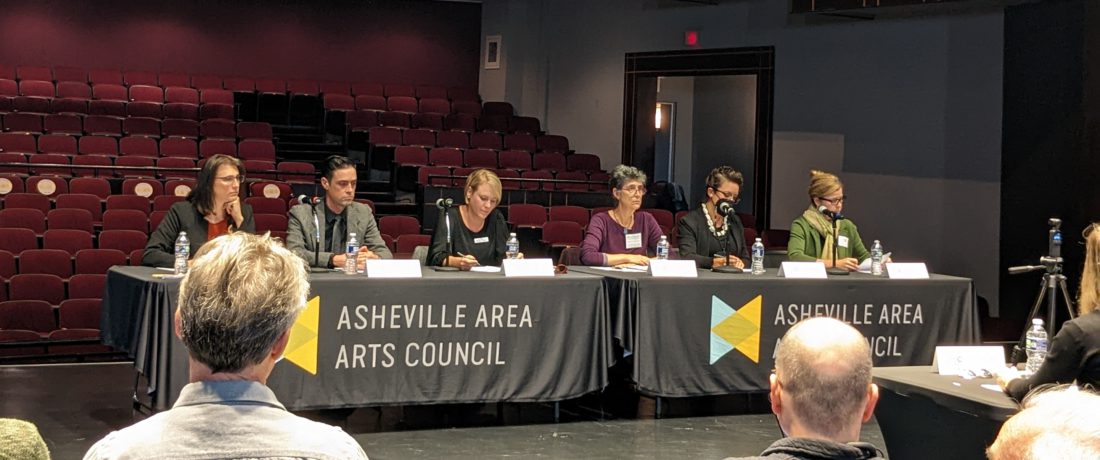If the promises of political candidates are to be believed, Asheville’s arts community will be in good hands regardless of who’s elected mayor and to City Council. Or at least that will be the case for those individuals who participated in the Asheville Area Arts Council’s third and final Arts AVL Town Hall events Oct. 12 at the Diana Wortham Theatre.
Vying for three City Council seats, challengers Allison Scott, Andrew Fletcher, Maggie Ullman Berthiaume and Nina Tovish participated in the event, along with mayor Esther Manheimer and mayoral challenger (and current council person) Kim Roney. City Council incumbents Antanette Mosley and Sheneika Smith did not partake. AAAC Arts Coalition chairs Jessica Tomasin and Reggie Tidwell served as moderators.
Similar to the previous two Arts AVL Town Halls held during the 2022 election cycle, this round of candidates was asked about issues facing the creative sector. But unlike past events, three of the participants in the final gathering were also professional artists — Fletcher, Roney and Tovish.
Also a first in the series was the planned departure of Manheimer, who provided written responses to subsequent questions following her exit. (Manheimer had to leave the event to moderate U.S. Senate candidate Cheri Beasley‘s nearby town hall event.) Tomasin and Tidwell alternated reading the mayor’s pre-written responses. In them, Manheimer touted past and ongoing city accomplishments for the arts, including the Art in the Heart series of public installations and performances in Pack Square Plaza.
Professional pianist Fletcher, multidisciplined artist Tovish and music educator Roney provided personal anecdotes from the front lines of being a working artist in Asheville. Scott — attempting to be North Carolina’s first openly transgender elected official — touted her support of queer creatives and people of color through her work at the Campaign for Southern Equality. Meanwhile, Berthiaume highlighted her past role as Asheville’s first sustainability officer as well as her ability to work quickly for artists, if elected.
All participants advocated for the passage of both county bond referendums on the Nov. 8 ballot. They also all spoke in favor of increased funding for the arts, prioritizing programs to create affordable housing specifically for artists and establishing a full-time city position for the management of public art.
In addition, the candidates stressed that continued financial support for nonprofits to host outdoor events is essential in maintaining a thriving public square, particularly when it comes to assisting minority-led organizations with little to no event organizing experience.
“On City Council, we need people who get the big picture and look at it from different lenses, whether it be equity or whether it be just an impact on the community,” Scott said. “And sometimes just realizing that we need to help some groups more than others.”
The candidates found further common ground on addressing the city’s changing landscape.
“The housing problem in Asheville needs to be addressed through a portfolio of solutions,” Tovish said. “It is our responsibility as a community to mitigate the harm that is being done.”
To that point, Fletcher spoke out against short-term rentals, saying that he knows far more friends who’ve been forced out of homes due to Airbnbs than because of hotels. These and others whom he called his “logical voters” now live outside city limits and therefore are unable to select him on their ballots.
“These are the people that we call ‘traffic’ now — they used to be ‘neighbors,’” he said.
The controversial proposed Duke Energy substation on Lexington Avenue in conjunction with an expansion of the out-of-date Thomas Wolfe Auditorium was also discussed, with Berthiaume reflecting on her battles with the utilities provider at the state level through her participation in a coalition composed of residents from 15 North Carolina cities.
“[Duke Energy employees] might not be rocket scientists, but they’re nuclear scientists, for crying out loud,” she said. “They can come up with some engineered solutions to meet what we’re looking for.”
Meanwhile, Roney tied the alarming speed and lack of transparency with which the current Duke plan was developed to her overarching commitment to open meetings.
“Which comes first, the planning or the engagement? It has been the planning, and then we’ll sell the public on it,” she said. “I need you to keep bringing your voices to the table so we can come up with solutions together. Because no group of seven people is going to be able to fix the mess that we’re in without us all coming to the table and helping.”
While the Arts AVL Town Hall series has concluded, the larger Creative Sector series that it’s under continues Wednesday, Nov. 2, with the State of the Arts Brunch at The Orange Peel. And in February, newly appointed state, county and city officials will participate in a meet-and-greet with the local arts community. To learn more, visit avl.mx/but.




It would be nice to know why the two missing incumbents chose not to partake.
Agreed. This was the case at all three town halls and reasons were not provided.
I’m really concerned about this trend with Councilwomen Mosley and Smith. They have never responded to my emails regarding Community matters. They do not attend Town Halls while running for office or give reasons for their absence. Why on Earth should we vote for them?
That’s useful information as I decide how to vote. Thank you.